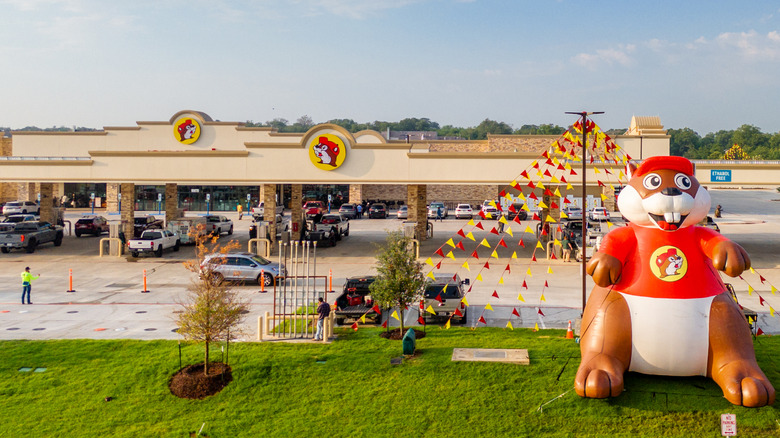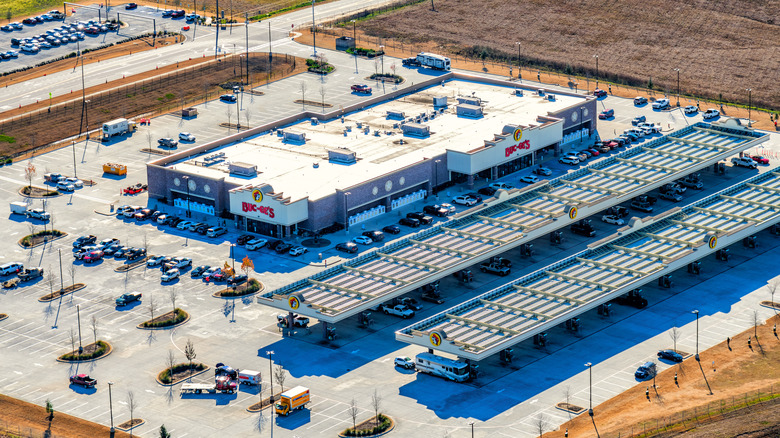Road Trippers Rejoice As Texas' Legendary Gas Station Chain With Cult Favorite Eats Expands Into Other States
If you've been on a road trip through South Texas in the past three decades, chances are you've noticed a gas station and convenience store chain as vast and sprawling as the state itself. Its logo — a buck-toothed beaver — appears on interstate billboards for miles before you arrive. They say everything's bigger in Texas, and "the world's largest convenience store" lives up to the claim: Buc-ee's, the legendary pop culture phenomenon is huge, and arguably one of America's favorite roadside pit stops.
Buc-ee's has developed a cult following thanks to social media, a 2012 national award for "America's cleanest bathrooms," and its over-the-top offerings: Row after row of well-lit gas pumps, a wide array of hot food and snacks (likely why Samantha Brown says it's one of the best ways to taste regional food on a road trip) and a full-blown home goods store selling everything from deer feed to bathing suits. If you're lucky, you'll spot a life-sized beaver posing for photos — that's Buc-ee himself. Oh, and every Buc-ee's is open 24/7, 365 days a year.
Buc-ee's fever is spreading: There are 54 Buc-ee's locations in eight states across the South and one in Colorado, as of this writing. In 2025, Buc-ee's opened its first Mississippi and Virginia locations, and there are more planned, including expansions to North Carolina, Missouri, and Arizona, and the Midwest. Co-founded in 1982 by Arch "Beaver" Aplin, Buc-ee's grew to 30 stores in Texas and started breaking its own size records in 2012 before expanding out of state starting in 2019.Tennessee now claims the biggest Buc-ee's. The chain markets itself primarily as a convenience store, and while it's certainly convenient, that hardly captures Buc-ee's scale. As one fan told the The New York Times, "It's the Wal-Mart of gas stations."
Not everyone wants more Buc-ee's
While Buc-ees is indeed some motorists' dream, some think it's an energy-eating, concrete slab that creates excess waste. "It's the worst example of runamok capitalism and consumerism I've seen directly with my own eyes," said one horrified Reddit user, adding that it's an "Americana funhouse of horrors." Indeed, Buc-ee's size and scope contrasts with, say, typically smaller 7-11s in Japan, which still offer a satisfying array of budget-friendly goods and delicious meals.
In 2025, the mayor of Palmer Lake, Colorado, resigned during a battle to keep the state's second planned Buc-ee's out of town. He's not the only one against the megastore: Palmer Lake residents filed a lawsuit to stop the expansion, arguing concerns over traffic impacts, light pollution, wildlife risk, and an estimated 20% increase in local water demand. The first planned expansion to North Carolina also met with protests, who claimed the proposed complex would endanger the environment, threaten Indigenous sites, leak carcinogenic toxins, and increase air pollution without promoting local businesses. Critics have also decried Buc-ee's promotion of fossil fuels, rather than helping transition to renewable fuel sources. The North Carolina Buc-ee's still plans to open in late 2026 or early 2027, and Palmer Lake may yet approve its Buc-ee's, too.
Supporters claim Buc-ees does help local economies: The store pays higher wages than the federal minimum, and refuses to franchise so that it can maintain its independence and focus on customer experience over profits. Buc-ee's also promotes local vendors in its stores. Tami Curtis, a Mississippi artist, was elated to have her art for sale in the Buc-ee's Pass Christian location. "I've never been so happy to have my artwork hanging in the corridor to a bathroom in my whole life," she told The New York Times.

